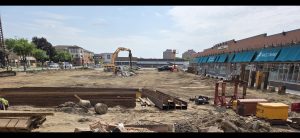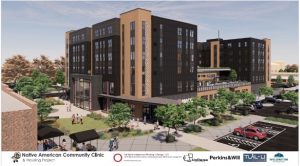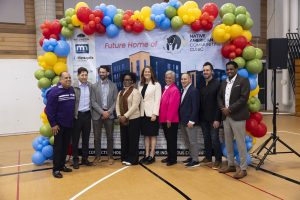Post From Community Close Ups
Minneapolis is home to one of the largest urban Native American populations in the U.S. On Franklin Avenue, the heart of the city’s Native community, a vacant space, left by a former strip mall, is being transformed into an integrated health center and affordable housing project.
The Native American Community Clinic (NACC), a federally qualified health care center, has long worked to promote the health and wellness of Native families, attending not just to the body, but to mind and spirit. Building on this mission, NACC is transforming a vacant space in the former strip mall into an unapologetically Indigenous development designed to restore balance through connection to land, ceremony, family, and community. By combining housing with culturally rooted healthcare, NACC is creating a place where Native families can thrive for generations.
When the Native American Community Clinic (NACC) first opened its doors in 2003, it occupied a space on the east side of a small Minneapolis strip mall. Founded to address the deep health disparities affecting the urban Native American community in the Twin Cities, NACC offers comprehensive medical, behavioral health, dental, and substance use services while also tackling the underlying social and structural causes of poor health.
For years, NACC envisioned expanding its space to meet the growing needs of the community. With their eye on an adjacent space occupied by a Dollar Tree, the clinic made several requests to buy the property but the answer was always no.

The construction zone at the vacant strip mall.
Everything changed in 2020. As the COVID-19 pandemic shuttered businesses and upended daily life, the Dollar Tree closed, leaving its portion of the mall unexpectedly vacant. What could have been just an empty storefront became a rare opportunity for NACC to grow and coincided with the clinic’s rapidly expanding role in pandemic response. Seizing the moment, NACC quickly converted part of the space for COVID-19 testing and vaccinations. Federal and state pandemic funding flowed in aimed at strengthening public health infrastructure and NACC saw a chance to act decisively, turning a temporary response into a more strategic long term investment.
What began as a small health clinic in a strip mall has evolved into something more: a powerful community-led innovation model demonstrating how a Native health organization can transform a crisis into an enduring opportunity for healing, resilience, and self-determination.
At the same time, four blocks away, a large encampment lined a nearby avenue, where members of the Native community experiencing homelessness were living in tents. The crisis confirmed what NACC had long recognized: that health and housing are inseparable. If the clinic’s mission was to heal the community, that healing had to include access to safe, stable, and affordable homes. NACC drew on their earlier work with Red Lake Nation, which had integrated a health clinic within a housing development, and reconnected with those partners to bring a similar vision to life in Minneapolis.

Native American Community Clinic and Housing Project Exterior Design.
Today, that vision is becoming reality. NACC has raised more than $100 million to create 83 units of affordable housing alongside co-located medical, behavioral health, dental, and administrative services. Residents will have access to a community plaza for ceremony and cultural gatherings, traditional medicinal plantings, a rooftop garden, a children’s play area, and outdoor spaces where residents and staff can connect. What began as a small health clinic in a strip mall has evolved into something more: a powerful community-led innovation model demonstrating how a Native health organization can transform a crisis into an enduring opportunity for healing, resilience, and self-determination.
Partners: Native American Community Clinic (NACC), Twin Cities-based Wellington Management, Inc., United Healthcare Group, Minneapolis Public Housing Authority, Greater Minnesota Housing Fund, and other funders (see financial information below)
Services: Medical, Dental, Behavioral Health, and Substance Abuse Treatment
Project status: In progress
Project scale: 30,000 square feet healthcare and housing development with 83 units of affordable housing, family-oriented amenities that include a rooftop garden, children’s play area, a community plaza for ceremony and cultural gatherings
Financing: The NACC health clinic and affordable housing projects came together through braided funding from both public and private sources. This approach combined several types of financing such as tax credit investments, loans, and local government support to make the project possible and keep the housing affordable. While each project has its own capital stack, NACC and Wellington Management collaborated closely to undertake joint fundraising efforts that supported both initiatives
Financing Details for Housing Development:
Financing Details for Health Clinic:
For NACC, a Native-led organization, the journey to create an integrated housing and health development was never just about constructing a building; it was about reclaiming land and asserting long-term sovereignty for Native communities. NACC knew that any successful collaboration would have to be rooted in shared values and a deep respect for Native land, leadership, and community priorities. The housing development, owned by NACC, is located on Dakota land and from the start, the organization insisted it should remain in Native ownership.
And I thought, this is the answer to some of our challenges in healthcare and in our community. We need places where people can heal and practice ceremony, where generations can live side by side and reconnect with the ways we used to live together.

Dr. Stately speaking at the donor dinner.
The idea that housing could also be a space for belonging and healing came into focus for Dr. Antony Stately, Ojibwe/Oneida, Executive Officer and President of NACC, during a Sun Dance ceremony. As he stood in the ceremonial arbor, watching relatives dance together, he witnessed “elders, parents, and grandbabies all moving together in this beautiful healing ceremony,” he recalled. “And I thought, this is the answer to some of our challenges in healthcare and in our community. We need places where people can heal and practice ceremony, where generations can live side by side and reconnect with the ways we used to live together.” That vision of a community grounded in culture, healing, and togetherness became a guiding force for the project.
Dr. Stately carried those values into every conversation with potential development partners. In early meetings with Wellington Management, a Twin Cities affordable housing developer, he was upfront about what NACC needed from the partnership: “I know that a lot of developers, when you enter into these relationships with them, they get to own the property and the land,” he said. “I’m going to start with this conversation and tell you, this is going to be owned by NACC and the community. We’re not going to give up the land. So we’re starting with that. If that’s not something you’re willing to do, then we can just stop the conversation now.”

Dr. Stately, Wellington Management, and other partners at the donor dinner.
Wellington’s willingness to honor Native ownership and NACC’s vision became the foundation for a relationship built on trust and respect. That early clarity of values proved invaluable, not only in guiding project decisions, but in shaping the fundraising strategy. As the project moved forward, Wellington worked alongside NACC to help raise funds with those principles front and center, ensuring that every potential investor or partner understood the mission: to strengthen Native health, housing stability, and self-determination.
This values-driven approach secured investors like UnitedHealthcare Group, which became the project’s largest private funder. The opportunity arose at a Greater Minnesota Housing Fund webinar, where UnitedHealthcare leaders spoke about their commitment to addressing the intersection of health and housing recognizing that stable, affordable homes are essential to health. Dr. Stately spotted the connection and followed up personally, reminding UnitedHealthcare that NACC’s project embodied the very principles they had just articulated publicly.
That conversation led to a transformative investment: $17.9 million from UnitedHealthcare Group, through a partnership with the Minnesota Equity Fund and Cinnaire. Their contribution became a cornerstone of the project’s financing and demonstrated how values alignment can translate directly into real-world impact.
In the end, NACC’s fundraising success wasn’t just about securing dollars, it was about cultivating relationships grounded in shared purpose.
Assembling the full financing package was not easy. As Dr. Stately noted, the final few million dollars in a campaign of this size are often the hardest to raise. NACC and its partners had to return to original funders, making the case for additional support to close gaps as costs shifted. Their persistence paid off, existing partners stepped up, contributing more because they believed deeply in the mission and trusted the leadership.
Recognizing the project’s significance to the community and the city as a whole, the City of Minneapolis increased its commitment, contributing an additional $1 million from the Affordable Housing Trust Fund. Program-related investments from Native American Bank, Allina Clinics, and Bremer Bank provided the resources needed to meet tax credit requirements and ensure the project could close on time. Together, these contributions filled practical funding gaps while signaling a shared recognition of the project’s value as a model for culturally grounded, community-led development.
The Native American Community Clinic’s journey from a small clinic in a strip mall to a visionary model of integrated health and housing reflects the power of Indigenous leadership and values in shaping community-driven solutions.
In the end, NACC’s fundraising success wasn’t just about securing dollars, it was about cultivating relationships grounded in shared purpose. By being transparent about their values, and holding partners accountable to their commitments, NACC was able to transform a bold vision into a sustainable reality that will serve generations to come.
The Native American Community Clinic’s journey from a small clinic in a strip mall to a visionary model of integrated health and housing reflects the power of Indigenous leadership and values in shaping community-driven solutions. By centering wellness, belonging, and sovereignty, NACC has shown that health is more than care delivered within clinic walls. It is rooted in stable homes, cultural connection, and self-determination.
This project stands as a testament to what becomes possible when partners align around shared values and invest in a future where Native families can heal, thrive, and reclaim wellness together.